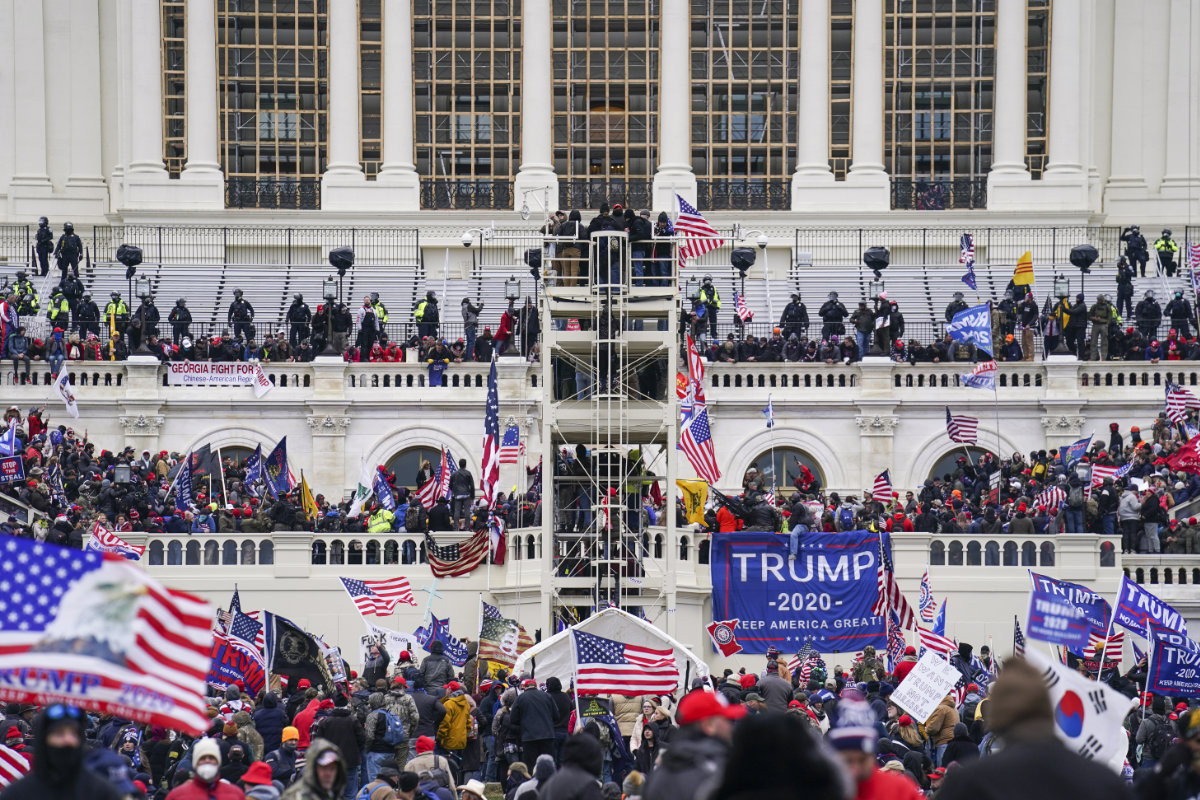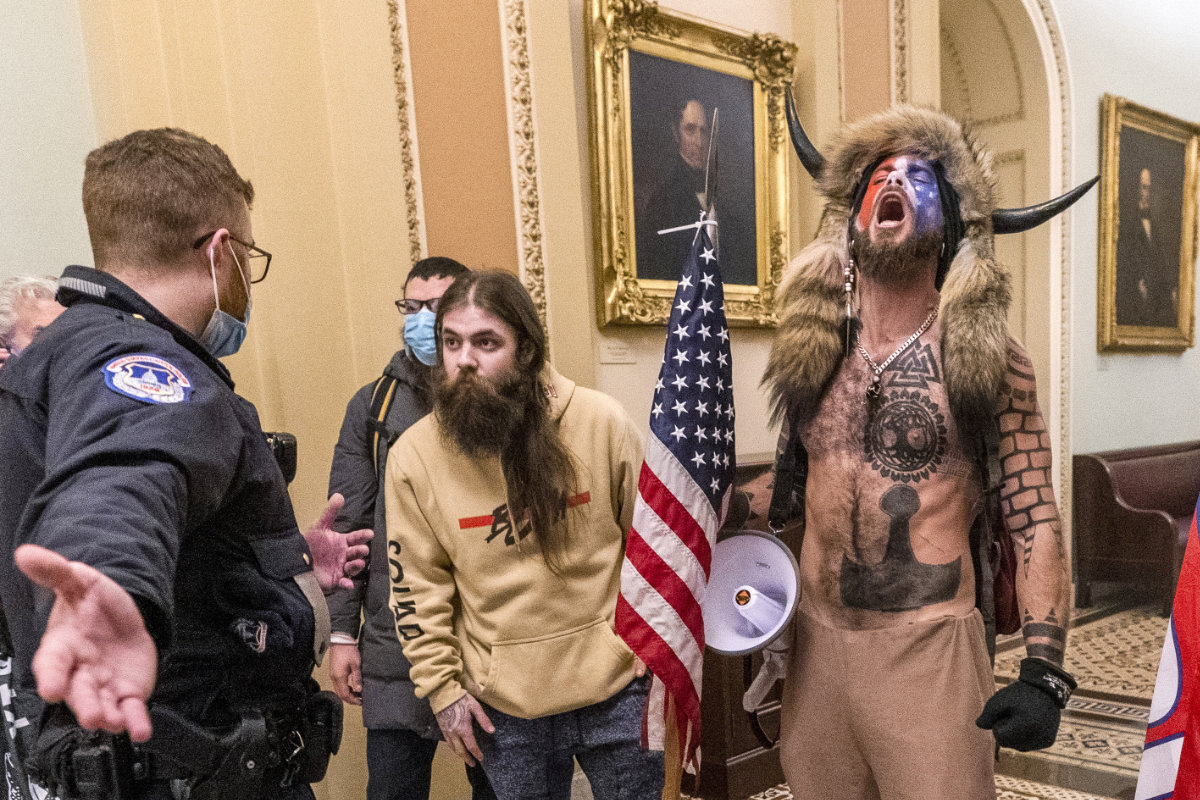WASHINGTON: The House panel investigating the Jan. 6 insurrection at the US Capitol laid the blame firmly on Donald Trump Thursday night, saying the assault was hardly spontaneous but an “attempted coup” and a direct result of the defeated president’s effort to overturn the 2020 election.
With a never-before-seen 12-minute video of the deadly violence and startling testimony from Trump’s most inner circle, the House 1/6 committee provided gripping detail in contending that Trump’s repeated lies about election fraud and his public effort to stop Joe Biden’s victory led to the attack and imperiled American democracy
“Democracy remains in danger,” said Rep. Bennie Thompson, D-Mississippi, chairman of the panel, during the hearing, timed for prime time to reach as many Americans as possible.
“Jan. 6 was the culmination of an attempted coup, a brazen attempt, as one rioter put it shortly after Jan. 6, to overthrow the government,” Thompson said. “The violence was no accident.”
In a previously unseen video clip, the panel played a quip from former Attorney General Bill Barr who testified that he told Trump the claims of a rigged election were “bull— — .”
In another, the former president’s daughter, Ivanka Trump, testified to the committee that she respected Barr’s view that there was no election fraud. “I accepted what he said.”

Insurrectionists loyal to President Donald Trump breach the Capitol in Washington on Jan. 6, 2021.(AP File Photo)
Others showed leaders of the extremist Oath Keepers and Proud Boys preparing to storm the Capitol to stand up for Trump. Testifying in person was one of the offices, Caroline Edwards, who suffered serious injuries as she battled the mob that pushed into the Capitol.
“President Trump summoned a violent mob,” said Rep. Liz Cheney, R-Wyoming, the panel’s vice chair who took the lead for much of the hearing. “When a president fails to take the steps necessary to preserve our union — or worse, causes a constitutional crisis — we’re in a moment of maximum danger for our republic.”
There was an audible gasp in the hearing room, when Cheney read an account that said when Trump was told the Capitol mob was chanting for Vice President Mike Pence to be hanged, Trump responded that maybe they were right, that he “deserves it.”
Trump was angry that Pence, presiding in the House chamber, refused his order to reject the certification of Biden’s victory.
Police officers who had fought off the mob consoled one another as they sat in the committee room reliving the violence they faced on Jan. 6. Officer Harry Dunn teared up as bodycam footage showed rioters bludgeoning his colleagues with flagpoles and baseball bats.
Biden, in Los Angeles for the Summit of the Americas, said many viewers were “going to be seeing for the first time a lot of the detail that occurred.”
Trump, unapologetic, dismissed the investigation anew — and even declared on social media that Jan. 6 “represented the greatest movement in the history of our country.”
Repubicans on the House Judiciary Committee tweeted: “All. Old. News.”
The result of the coming weeks of public hearings may not change hearts or minds in politically polarized America. But the committee’s investigation with 1,000 interviews is intended to stand as a public record for history. A final report aims to provide an accounting of the most violent attack on the Capitol since the British set fire to it in 1814, and to ensure such an attack never happens again.
The riot left more than 100 police officers injured, many beaten and bloodied, as the crowd of pro-Trump rioters, some armed with pipes, bats and bear spray, charged into the Capitol. At least nine people who were there died during and after the rioting, including a woman who was shot and killed by police.
Emotions are still raw at the Capitol, and security will be tight for the hearings. Law enforcement officials are reporting a spike in violent threats against members of Congress.
Against this backdrop, the committee was speaking to a divided America, ahead of the fall midterm elections when voters decide which party controls Congress. Most TV networks carried the hearing live, but Fox News Channel did not.
Among those in the audience were several lawmakers who were trapped together in the House gallery during the attack.
“We want to remind people, we were there, we saw what happened,” said Rep. Dean Phillips, D-Minnesota ”We know how close we came to the first non-peaceful transition of power in this country.”

Rioting supporters of President Donald Trump are confronted by US Capitol Police officers outside the Senate Chamber in Washington on Jan. 6, 2021. (AP File Photo)
The committee chairman, civil rights leader Thompson opened the hearing with sweep of American history. saying he heard in those denying the stark reality of Jan. 6 his own experience growing up in a time and place “where people justified the action of slavery, the Ku Klux Klan and lynching.”
Republican Rep. Cheney, the daughter of former Vice President Dick Cheney, outlined what the committee has learned about the events leading up to that brisk January day when Trump sent his supporters to Congress to “fight like hell” for his presidency as lawmakers undertook the typically routine job of certifying the previous November’s results.
Among those testifying was documentary maker Nick Quested, who filmed the Proud Boys storming the Capitol — along with a pivotal meeting between the group’s then-chairman Henry “Enrique” Tarrio and another extremist group, the Oath Keepers, the night before in nearby parking garage.
Court documents show that members of the Proud Boys and Oath Keepers were discussing as early as November a need to fight to keep Trump in office. Leaders both groups and some members have since been indicted on rare sedition charges over the military-style attack.
In the weeks ahead, the panel is expected to detail Trump’s public campaign to “Stop the Steal” and the private pressure he put on the Justice Department to reverse his election loss — despite dozens of failed court cases and his own attorney general attesting there was no fraud on a scale that could have tipped the results in his favor.
The panel faced obstacles from its start. Republicans blocked the formation of an independent body that could have investigated the Jan. 6 assault the way the 9/11 Commission probed the 2001 terror attack.
Instead, House Speaker Nancy Pelosi ushered the creation of the 1/6 panel through Congress over the objections of Senate Republican leader Mitch McConnell. She rejected Republican-appointed lawmakers who had voted on Jan. 6 against certifying the election results, eventually naming seven Democrats and two Republicans.
House GOP Leader Kevin McCarthy, who has been caught up in the probe and has defied the committee’s subpoena for an interview, echoed Trump on Thursday. He called the panel a “scam” and labeled the investigation a political “smokescreen” for Democrats’ priorities.
The hearings are expected to introduce Americans to a cast of characters, some well known, others elusive, and to what they said and did as Trump and his allies tried to reverse the election outcome.
The public will learn about the actions of Mark Meadows, the president’s chief of staff, whose 2,000-plus text messages provided the committee with a snapshot of the real-time scramble to keep Trump in office. Of John Eastman, the conservative law professor who was the architect of the unsuccessful scheme to persuade Vice President Pence to halt the certification on Jan. 6. Of the Justice Department officials who threatened to resign rather than go along with Trump’s proposals.
The Justice Department has arrested and charged more than 800 people for the violence that day, the biggest dragnet in its history.




























